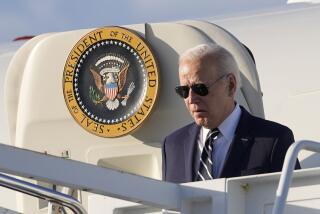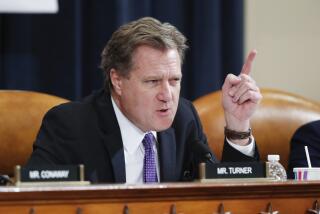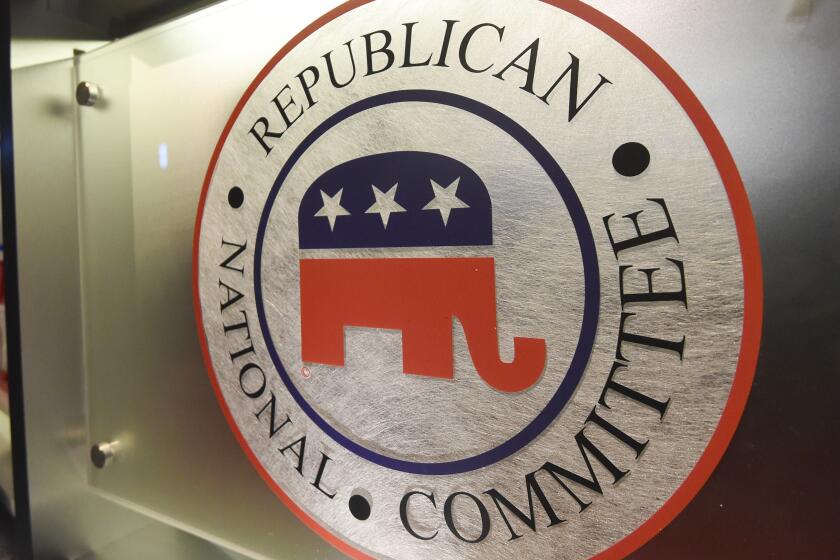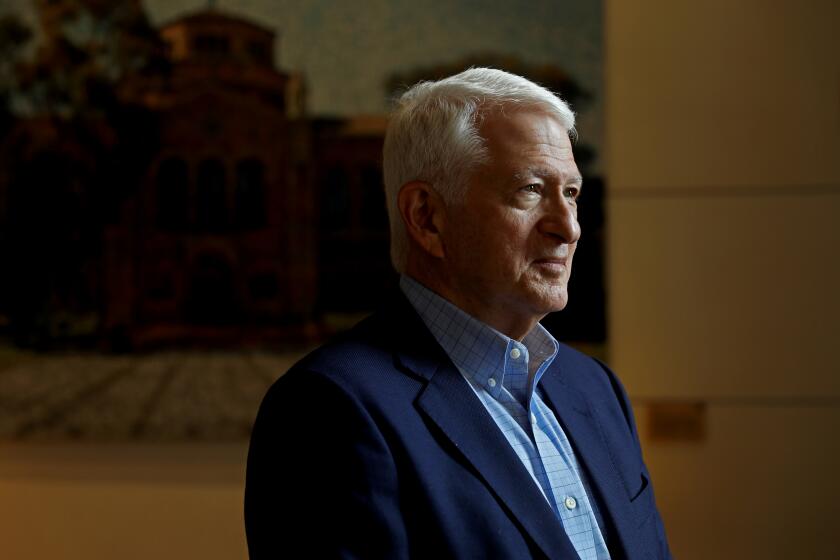Top Reagan Aides Planned Cover-up, Iran Panel Is Told
Former White House aides Oliver L. North, John M. Poindexter and Robert C. McFarlane and the late CIA Director William J. Casey all concurred in a cover story that they knew to be inaccurate shortly after U.S. arms sales to Iran became publicly known last November, Congress’ Iran- contra committees were told Thursday.
Assistant Atty. Gen. Charles J. Cooper testified that he attended a White House meeting last Nov. 20 in which North, Poindexter, Casey and Atty. Gen. Edwin Meese III drafted the testimony that Casey would give the next day to two congressional committees. In his testimony, Casey misled members of Congress about U.S. sponsorship of an Israeli shipment of Hawk anti-aircraft missiles to Iran in November, 1985.
During the meeting, Cooper testified, North proposed an editing change in the testimony stating that no one in the U.S. government was aware of the Hawk shipment at the time it occurred. Poindexter and Casey agreed to the change, Cooper said.
Refers to ‘Bulk Cargo’
The testimony they drafted suggested that all top Administration officials were under the impression that the plane from Israel to Iran contained oil-drilling equipment and that they did not learn until the following January that the plane carried 18 U.S.-made Hawks. Although the reference to oil-drilling equipment was deleted before Casey delivered his testimony, he made no mention of Hawk missiles and instead referred to the shipment as “bulk cargo.”
There is abundant evidence now that all three men knew about the Hawk shipment from the beginning.
McFarlane told Meese a similar story about oil-drilling equipment when he was interviewed by Meese and Cooper on the following day, according to Cooper, even though the story contradicted evidence Cooper already had collected indicating that McFarlane also had been fully informed about the Hawk shipment shortly before it occurred.
The top Reagan Administration officials apparently were reluctant to admit that they knew about the Hawk shipments at the time because it was against the law for the United States to approve an Israeli shipment of U.S.-made weapons to Iran without the written approval of the President, Cooper said.
Cooper was present at the White House meeting and witnessed Meese’s interview of McFarlane as part of a much-criticized investigation of the Iran arms sales that Justice Department officials undertook last November. The probe ultimately uncovered the diversion of funds from the arms sales to Nicaragua’s contra rebels.
Rep. Bill McCollum (R-Fla.), normally a Reagan Administration loyalist, described Cooper’s account as clear evidence that there was a high-level Administration “cover-up” under way at the same time that Meese began to investigate the matter for President Reagan.
“We had a group of people, at least three of them and possibly four, in Col. North, Adm. Poindexter, Mr. McFarlane and probably Director Casey, who were deliberately deceiving and lying to the attorney general of the United States about the involvement of the United States in the shipment of these missiles in November of 1985,” McCollum said.
“If it’s not a crime, it’s certainly one of the highest acts of insubordination and one of the most treacherous things that’s ever occurred to a President, it seems to me, in our history,” he said.
Sen. William S. Cohen (R-Me.) told Cooper that it sounded to him as if “Col. North and the others were attempting to take you over Niagara Falls in a barrel.”
Committee members chastised Cooper for the failure of Justice Department officials to launch a full-scale criminal investigation of the Iran-contra affair as soon as they realized that Administration figures were telling a false story. According to the committees, the FBI was not called into the investigation until Nov. 28--three days after Meese publicly disclosed the diversion of funds to the contras.
But Cooper, who said he learned the truth about the Hawk shipments shortly after the Nov. 20 White House meeting and quickly took steps that he hoped would prevent Casey’s misleading testimony, staunchly defended the investigative procedures followed by Meese and the Justice Department.
“It was not the time to call in the FBI, in my opinion,” he insisted, referring to Nov. 20. “There was no hint of criminal activity. . . . The worst spin you could put on it was that there was going to be a knowing error made with respect to the representation to Congress.”
Sen. Warren B. Rudman (R-N.H.) said that Meese made a serious mistake initially by putting civil attorneys such as Cooper in charge of what was clearly a criminal case. “We had a group of the world’s best cardiologists trying to do neurosurgery,” he said.
Rudman noted that the Justice Department did not seal the records in North’s office that pertained to the Iran-contra scandal until late in the day Nov. 25, even though a criminal investigator would have done it sooner. Cooper said that an aide to Meese had failed to carry out the attorney general’s order to seal the records earlier in the day.
Meese and Justice Department officials also foolishly divulged their strategy to North when they interviewed him about the Iran-contra affair on Sunday, Nov. 23, according to Rudman. As Rudman put it: “You telegraphed what you were doing to North on Sunday afternoon and he knew exactly what he had to do”--a reference to North’s later efforts to cover up.
Rudman added that the testimony so far has underestimated the amount of White House documents shredded by North after the Justice Department investigation began. “There was enough shred to fill up a half of a box car,” he said.
Senate committee Chairman Daniel K. Inouye (D-Hawaii) noted that Meese told Poindexter on Nov. 21 that his investigators planned to search North’s files the following day. That night, North staged what he described as a “shredding party” to destroy documents related to the Iran-contra affair.
“Do you believe Adm. Poindexter warned Col. North?” Inouye asked.
“Somebody did, it appears,” Cooper replied.
Despite the shredding, Justice Department officials found many incriminating documents in North’s office--including a memo written in April, 1985, by North that outlined the diversion of funds from the Iranian arms sales to the Nicaraguan resistance.
Cooper disclosed that when North was asked by Meese on Nov. 23 about the diversion document, the Marine colonel quickly asked: “Did you find a cover memo?”
“Should we have found one?” Meese asked.
North replied: “No, I just wondered.”
North’s question was particularly interesting to investigators because the now-famous memo is not addressed to anyone, and committee members suspect that the name of the intended recipient was deleted by North as part of a cover-up.
According to Cooper, North told Meese that the memo was intended for Poindexter and did not go to President Reagan, who has denied knowing about the diversion. “There was no indication in his demeanor that he (North) wasn’t being entirely truthful,” he added.
Yet North also clung to the story about oil-drilling equipment when he was interviewed on Nov. 23 by Meese, Cooper said. In fact, he told Meese that while he always suspected that the November, 1985, shipment to Iran was not oil-drilling equipment, he probably could pass a polygraph test proving that he did not know the shipment contained Hawks.
Defer to North
At the White House meeting three days earlier at which Casey’s testimony was reviewed, Cooper said, everyone in attendance deferred to North when he asserted that no one in the Administration had known that the shipment contained anti-aircraft missiles. Cooper said the attitude of Casey and Poindexter was: “OK, if that’s the way it was, then fine.”
After hearing Cooper’s story, House committee attorney Pamela Naughton introduced four documents written by North to Poindexter in November, 1985, clearly indicating that both men were aware of the shipment of Hawk missiles. In fact, it is clear from previous testimony that North himself drew the CIA into the operation when the shipment became hung up in Portugal.
Likewise, Naughton produced a document dated Nov. 26, 1985, showing that Casey learned about the Hawk shipment and the CIA’s involvement a few days after it occurred. Former CIA general counsel Stanley Sporkin testified on Wednesday that he was the one who told Casey then.
Cooper said that he did not learn the truth about what these top Administration officials had known until later on Nov. 20, 1986, when he visited the office of White House counsel Peter J. Wallison, who had learned from State Department legal adviser Abraham D. Sofaer that there was evidence that officials were fully aware at the time of the Israeli arms shipments to Iran.
Sofaer’s conclusion was based on notes taken by Secretary of State George P. Shultz of a meeting at the Geneva summit in November, 1985, in which he was told specifically about the Hawk shipment by McFarlane, then the President’s national security adviser.
But North, Poindexter and McFarlane stuck by their story about oil-drilling equipment, according to Cooper, even after they were told about Shultz’s notes. When McFarlane was questioned about the matter by Meese on Nov. 21, he said, the former White House official insisted that he thought the shipment contained drilling equipment.
Threatens to Resign
It was not until Cooper notified Meese of the discrepancy and Sofaer threatened to resign over the matter that Casey’s prepared testimony was corrected, deleting the sentence that referred to oil-drilling equipment. Cooper said the correction occurred only hours before Casey testified before the House and Senate intelligence committees.
Nevertheless, Casey, who had a reputation for misleading congressional questioners, was not entirely candid in his testimony, which he delivered to the House Intelligence Committee. A transcript of his testimony shows that he referred to the 1985 shipment as “bulk cargo”--never mentioning Hawk missiles.
Crew Reportedly Mislead
While he did not say that Administration officials thought the cargo was oil-drilling equipment, he said that the plane crew had been told in Tel Aviv that the cargo was oil-drilling equipment.
Sofaer, whose private testimony to the committee last week was released Thursday, recalled that he contacted Deputy Atty. Gen. Arnold I. Burns last November when he became suspicious that a high-level cover-up was under way involving Casey’s prepared testimony.
According to Sofaer, Burns assured him that Meese “knew of certain facts that explained all these matters and that laid to rest all the problems I might perceive.” But Sofaer was not satisfied.
“I was scared that the President would be in trouble if the testimony was not changed and if people were not forced to tell the truth about all this,” he said.
Sofaer’s suspicions grew on Nov. 20 when, with a little research, he learned that prices the Pentagon got for the Hawk missiles were far below the amount that could easily be charged on the world market. “I was very concerned about the possibility that there was a surplus of funds,” he said.
Finally, Sofaer said he learned that Southern Air Transport had helped deliver the arms, and he recalled that this was the firm involved in shipments of arms to the contras. “It was a red flag indicating a possible connection to Central America,” he said.
Justice Department officials on Nov. 22 found the North memo describing the diversion of Iran arms sale profits to the contras. But Cooper did not acknowledge in their conversation that Sofaer had drawn the right conclusion.
Cooper said Justice Department officials were instantly aware of the political and legal impact of the diversion memo. He recalled that Meese used an uncharacteristic expletive when he was told about it--”something analogous to, ‘Oh, darn.’ But it’s perhaps more strenuous than that.”
When Casey learned about the Justice Department’s discovery, he called Cooper. Cooper recalled that Casey asked him whether they had come across any evidence of “Lakeside Resources”--an apparent reference to the Swiss bank account used in the Iran-contra affair known as Lake Resources Inc. Cooper replied that it was vaguely familiar.
“Why do you want to know?” Cooper asked. But he said Casey hung up without explanation.
The joint committee hearings adjourned until July 7, when Col. North is scheduled to testify.
More to Read
Get the L.A. Times Politics newsletter
Deeply reported insights into legislation, politics and policy from Sacramento, Washington and beyond. In your inbox three times per week.
You may occasionally receive promotional content from the Los Angeles Times.






